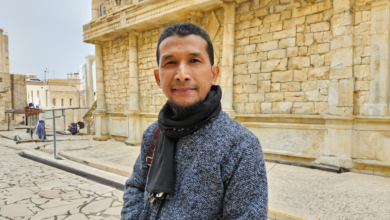
The main theme of the Qur'an
Oleh Ustadz Dr. H. May Dedu, Lc., SH, MESy.
Delivered on the study Online Migrant Madrasah (MPO) DDHK, Sunday, February 21, 2021
Al-Qur'an component, consisting of 30 juz. According to Middle Eastern prints, a juz consists of 20 pages. Per page, 15 lines.
In the Qur'an there are 114 letters. The verse is, if all the bismillah are included, the total will be 6.666 verses.
The main themes of the Qur'an are:
- Including monotheism, belief, and faith.
- This is a matter of permissibility, halal-haram, both in the area of worship and muamalah.
- Morals
- News or stories of people who lived before us (qashash). There is also news about what will happen (akhbar).
- Science.
In detail, the division of the verses of the Qur'an consists of:
- Commandments (Al-amru), 1.000 verses.
- Prohibition (an-nahyu), 1.000 verses.
- Threats, 1.000 verses.
- Promise, 1.000 verses.
- Stories and news, 1.000 verses.
- Lessons and parables, 1.000 verses.
- Halal-haram, 500 verses.
- Prayers, 100 verses.
- Nasikh and mansukh, 66 verses.
In total, totaling 6.666 verses.
Then, is there a verse or letter in the Qur'an that can represent the main themes and themes in detail? In fact there is. Namely, the letter Al-Fatihah. Surahs that we read over and over during prayer, letters that if any part of our body is sick and then read an odd number of times can become ruqyah and heal it.
The Prophet's hadith, "I will truly teach you, O Abi Said Almualla, the most basic letter in the Qur'an, namely the letter Al-Fatihah."
Surat Al-Fatihah compiles all the contents of the Qur'an. Ibn Abbas ra said, the mother of the book (divine religious books) is the Al-Qur'an, the mother of the Koran is the letter of Al-Fatihah, and the mother of Al-Fatihah is bismillahirrahmanirrahim.
That's why we call the letter Al-Fatihah the ummul of the book.
The main teachings in the letter Al-Fatihah contain:
The first verse, bismillahirrahmanirrahim. Inside are values:
- If a person doesn't have faith, how can he say the name of Allah?
- We want to eat and drink, and everything we want to do, always read basmalah.
- So every good deed if it doesn't start with basmalah will be cut off from the blessing.
- Dzikir, makes us remember Allah.
- Balance, both world and hereafter as well as body and soul.
The second verse, Alhamdulillahirobbil'alamin. It contains the value of praising, whether in difficult or happy situations, both in joy and sorrow.
There is also aqidah value here. That, everything we receive in this life comes from God. The law is that we should not be arrogant because whatever we have actually belongs to Allah. Morally, when we get something or don't get something, as creatures we must still praise Allah Ta'ala.
The third verse, arrahmanirrahim. Through this verse we know and understand Allah with His attributes.
Arrahman, God's nature for mankind as a whole. Arrahim, the nature of Allah's love is only for those who believe, and will be given in the afterlife.
Teaches morals, with regard to the heart, namely hasad (envy). The first sin committed in the sky was due to hasad, namely the devil's envy towards Prophet Adam. Likewise, the first sin in the world occurred because of hasad, the jealousy of the son of Adam to his brother.
If we really understand the nature of Arrahman and Arrahim of Allah, then there will be no hasad in our hearts. And we must continue to practice this. Sometimes, it is in our hearts that we want to be like other people, so there is already hasad and will be tired of life.
Why are so many people whose lives are in debt? Because they want to be like everyone else.
The fourth verse, malikiyaumiddin. This verse discusses faith, the afterlife, rewards for kindness, threats of evil, and news about life after death.
What we need to realize, our life is not long. If our days are only spent on material gathering and world-oriented, not after-oriented, then we will lose out.
The fifth verse, iyyakana'budu waiyyakanasta'in. There is a separation here between "worshiping" and "asking for help".
In this verse, we declare the worship of Allah first. In the sentence "na'budu", it means that there are obligations, orders, prohibitions, knowledge, sharia, and aqidah.
After we have fulfilled our obligations to Allah, then there will be rights, orders, prohibitions, aqidah, sharia, tawakal, and endeavors contained in the sentence "nasta'in".
This is the law of causality. After we worship and obey, please ask Allah.
The sixth verse, ihdinash-shiratalmustaqim. It is a prayer to ask always under Allah's guidance and guidance. This contains the values of sharia and halal-haram.
The seventh verse contains information about the prayer we asked for in the previous verse. First, shiratal-ladzina an'amta 'alaihim, the path of the people whom you give favors. That means containing stories of good people, lessons, and advice.
Second, ghaoirilmaghdubi'alaihim, are not people who are angry. This verse contains the story of bad people. People who are angry with Allah are those who have knowledge but are poor in charity. They know prayer, almsgiving, and smile well, but never pray, never give alms, never smile.
Third, waladh-dhollin, not the way of those who go astray. This contains the story of bad people, namely people who do a lot of charity but are not knowledgeable. [DDHK News]



